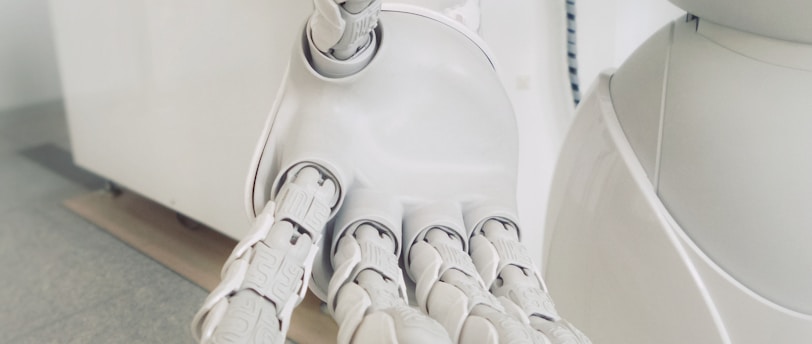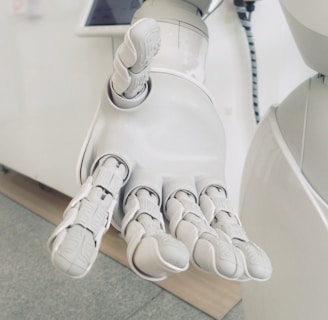Will Robots Replace Human Jobs? The Truth About Automation
TECHNOLOGYDIGITAL GADGETS
2/6/20254 min read


Introduction
Automation and artificial intelligence (AI) are advancing at an unprecedented pace, leaving many to wonder: will robots replace human jobs? This question sparks both excitement and fear. Some predict a future where machines take over most human tasks, leading to mass unemployment. Others argue that automation will generate new industries and jobs, fostering economic growth.
In this post, we will explore the impact of automation on employment, the industries most at risk, and whether humans can coexist with robots in the workforce.
Understanding Automation and AI
Automation refers to using technology to perform tasks without human intervention. This includes robotics, AI-driven algorithms, and machine learning systems that can execute complex processes once done exclusively by people.
AI and robotics have already transformed industries such as manufacturing, healthcare, finance, and customer service. Self-checkout kiosks, robotic process automation in banking, and AI-driven chatbots are just a few examples. As technology progresses, the scope of automation continues to expand.
Jobs Most Vulnerable to Automation
Not all jobs are equally susceptible to automation. Some roles, particularly those that involve repetitive and predictable tasks, are more at risk. According to studies by institutions like the World Economic Forum (WEF) and McKinsey & Company, the following industries face the highest threat:
1. Manufacturing and Factory Work
Robotic arms and AI-driven assembly lines have already replaced many factory jobs. Automated systems can assemble products with greater precision and efficiency than humans, reducing labor costs and increasing production rates.
2. Retail and Customer Service
With the rise of self-checkouts, automated inventory management, and AI chatbots, traditional retail jobs are declining. Many stores are integrating automation to streamline operations and enhance customer experiences.
3. Transportation and Delivery Services
Autonomous vehicles and drones are poised to disrupt the transportation sector. Self-driving trucks, automated warehouse robots, and drone delivery systems could replace many human workers in logistics and delivery.
4. Administrative and Data Entry Jobs
Routine administrative roles, such as data entry and bookkeeping, are increasingly being handled by AI-powered software. Optical character recognition (OCR) and natural language processing (NLP) enable machines to process and analyze data more efficiently than humans.
5. Fast Food and Hospitality
From automated kitchen robots that prepare meals to AI-powered kiosks taking orders, the fast-food industry is rapidly adopting automation to cut costs and improve service efficiency.
Jobs That Are Less Likely to Be Automated
While automation threatens some roles, others are less susceptible due to their complexity, creativity, and human-centric nature.
1. Healthcare and Medical Professions
While AI can assist with diagnostics and robotic surgeries, the demand for human healthcare professionals remains high. Empathy, critical thinking, and complex decision-making make these jobs harder to automate.
2. Creative and Artistic Fields
Writing, music, film production, and design require creativity and emotional intelligence, which AI struggles to replicate. While AI can assist in content creation, human artists and creatives are still irreplaceable.
3. Education and Training
Although AI-powered tutors and virtual learning platforms exist, human teachers play a crucial role in education. Personalized teaching, mentorship, and emotional intelligence make educators indispensable.
4. Skilled Trades and Craftsmanship
Plumbers, electricians, and carpenters rely on hands-on expertise, adaptability, and problem-solving. These skills make it difficult for robots to completely replace them.
5. Social and Emotional Intelligence-Based Jobs
Psychologists, social workers, and counselors depend on deep human connections and empathy—qualities that machines cannot easily replicate.
How Automation Can Create New Job Opportunities
Despite concerns over job loss, automation also generates new employment opportunities. Historical technological advancements, from the industrial revolution to the rise of computers, have always led to job creation. Here’s how automation can benefit workers:
1. Emergence of New Industries
Automation has given rise to fields such as AI development, robotics engineering, and data science. As companies invest in these technologies, new jobs emerge.
2. Increased Demand for Human Oversight
AI and robots require human supervision, maintenance, and ethical oversight. Roles such as AI ethics consultants, robotics maintenance specialists, and automation strategists are growing in demand.
3. Productivity Enhancement
By automating repetitive tasks, workers can focus on higher-value activities. This shift allows professionals to engage in more strategic and creative work, increasing productivity and job satisfaction.
4. Entrepreneurial Opportunities
Automation lowers business operation costs, allowing entrepreneurs to innovate and create new businesses. Small businesses can leverage automation to compete with larger corporations.
How to Adapt and Thrive in an Automated Future
To remain relevant in an evolving job market, workers must adapt to technological advancements. Here are some strategies:
1. Upskill and Reskill
Continuous learning is key. Developing technical skills in AI, data analysis, programming, and cybersecurity can help individuals stay competitive.
2. Focus on Soft Skills
Critical thinking, creativity, emotional intelligence, and adaptability are essential skills that AI struggles to replicate. Strengthening these abilities can future-proof careers.
3. Embrace Lifelong Learning
Staying updated on industry trends and new technologies ensures career longevity. Online courses, workshops, and certifications can enhance skill sets.
4. Leverage Technology
Instead of fearing automation, workers can integrate AI tools into their workflow to increase efficiency and productivity.
Conclusion: Will Robots Replace Human Jobs?
While automation will undoubtedly reshape the workforce, it is unlikely to lead to widespread human job displacement. Instead, it will transform industries, requiring workers to adapt and develop new skills. The key is to embrace change, stay informed, and leverage technology to our advantage.
Humans and robots can coexist in the workforce, with automation handling repetitive tasks and humans focusing on creativity, innovation, and human interaction. Rather than replacing jobs, automation is likely to redefine them, making work more efficient and rewarding.
Disclaimer
The information in this article is for informational purposes only and does not constitute professional career or financial advice. Readers are encouraged to conduct further research and seek professional guidance when making career-related decisions.
